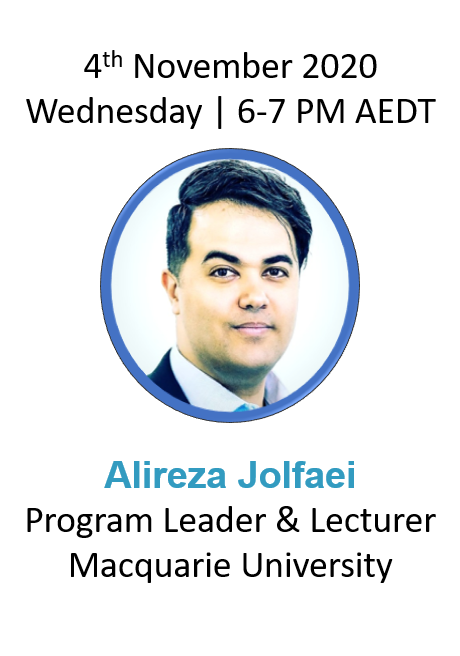Introduction to Cyber-Physical Systems Security 🗓
Dr Alireza Jolfaei
November 4, 2020 | Wednesday | 6 PM
ABSTRACT
Cyber-physical systems (CPS) comprise the backbone of national critical infrastructure such as power grids, transportation systems, and home automation systems, which are highly interconnected and mutually dependent systems. Such systems support a diverse set of services using a wide variety of Internet of Things (IoT) devices for sensing and actuation. The actions initiated by the service controllers could occasionally lead to conflicts or undesirable, unsafe outcomes both due to inadvertent misconfiguration, attacks on the configuration state, and poorly understood dependencies. From consumer IoT devices developed with minimal built-in security, which are often co-opted by malware to launch large distributed denial of service attacks on internet infrastructure, to remote attacks on industrial control devices, these newly connected, composed systems provide a vast attack surface. To this end, more secure configurations should be developed to address system vulnerabilities and minimize attack surfaces while maintaining expected functionality and performance. This talk covers relevant concepts, the state-of-the-art, representative solutions, and open challenges in CPS security. During the lecture, we will discuss different types of attack scenarios on the sensing and cyber parts of CPS with recent examples from intelligent transportation and power systems. We will next discuss the theoretical aspects and analysis of different mitigation strategies to secure the system from adversarial perturbations. We will compare the mitigation techniques and discuss their strengths and weaknesses. Finally, we will describe the practical implementation of each of the algorithms along with future challenges.
BIOGRAPHY

Alireza Jolfaei received the Ph.D. degree in Applied Cryptography from Griffith University, Gold Coast, Australia. He is the Program Leader of Master of IT in Cyber Security at Macquarie University, Sydney, Australia. His main research interests are in Cyber and Cyber-Physical Systems Security. He has participated in several projects involving different aspects of Cyber Security. On these topics he has published over 100 papers appeared in journals, conference proceedings, and books. Before Macquarie University, he worked as a Lecturer at Federation University Australia and as an Assistant Professor of Computer Science at Temple University, Philadelphia, PA, USA. He has received multiple awards for Academic Excellence, University Contribution, and Inclusion and Diversity Support. He received the prestigious IEEE Australian council award for his research paper published in the IEEE Transactions on Information Forensics and Security. He served as the Chairman of the Computational Intelligence Society in the IEEE Victoria Section and also as the Chairman of Professional and Career Activities for the IEEE Queensland Section. He has served as the associate editor of IEEE journals and transactions, including the IEEE IoT Journal, IEEE Sensors Journal, IEEE Transactions on Industrial Informatics, IEEE Transactions on Industry Applications, IEEE Transactions on Intelligent Transportation Systems, and IEEE Transactions on Emerging Topics in Computational Intelligence. He has served as a General co-Chair, a program co-Chair, a track Chair, a session Chair, and a Technical Program Committee member, for major conferences in Cyber Security, including IEEE TrustCom and IEEE INFOCOM. He is the General Chair of the 6th IEEE International Conference on Dependability in Sensor, Cloud, and Big Data Systems and Applications (DependSys 2020) in Fiji. He is a Distinguished Speaker of the Association for Computing Machinery (ACM) on the topic of Cyber Security and a Senior Member of the Institute of Electrical and Electronics Engineers (IEEE).

